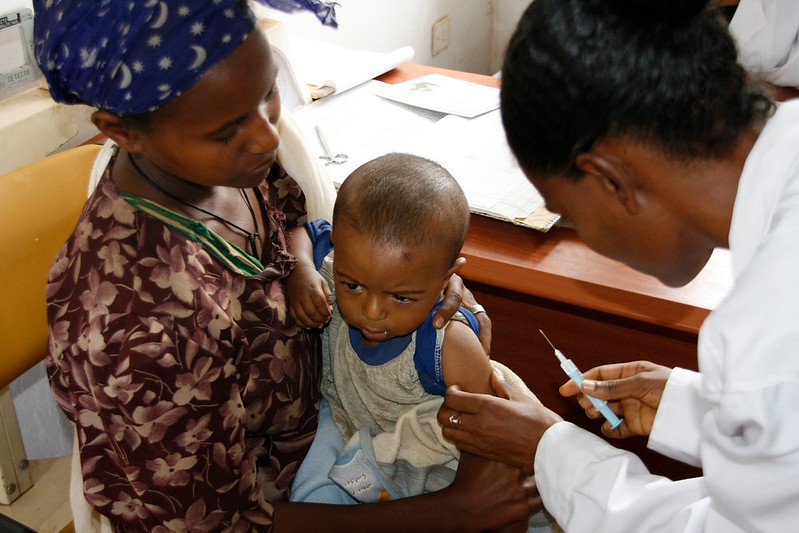On September 26, the eyes of antimicrobial resistance (AMR) experts everywhere will be on New York, where world leaders and policy makers will gather for the second United Nations High-Level Meeting on AMR.
Among those who'll be watching is Ramanan Laxminarayan, PhD, MPH, founder and president of the One Health Trust and a senior research scholar at Princeton University. A leading voice on AMR, Laxminarayan has been sounding the alarm about the potentially devastating toll of drug-resistant bacterial infections since the late 1990s. He knew it was becoming a problem because he could see what was happening in India's hospitals.
"I saw the real human toll of AMR here before it even showed up in the data," he told CIDRAP News. "And I have to admit that every time I thought this was going to get really bad, it's always surprised me by getting even worse."
I saw the real human toll of AMR here before it even showed up in the data.
But Laxminarayan remains optimistic that the world can tackle what he believes is a solvable problem by focusing on infection prevention and antibiotic access, particularly in the low- and middle-income countries (LMICs) where AMR has become a substantial cause of morbidity and mortality. CIDRAP News recently spoke with Laxminarayan about the UN meeting, the draft political declaration that will be discussed and debated, and why he's hopeful about the future. The interview has been lightly edited for length and clarity.
CIDRAP News: Let's start by going back to the 2016 UN High-Level Meeting on AMR and the political declaration on AMR that emerged from that meeting. Looking back over the past 8 years, what do you think has been achieved? And what were the missed opportunities?
Ramanan Laxminarayan: That meeting was good at establishing AMR as a legitimate global priority that countries need to cooperate on and that needs a multi-sectoral approach. It really put AMR on the world stage.
What it did not do was make any sort of firm commitments or targets. It really didn't establish any specific mechanisms for how to make progress beyond what eventually became the Global Leaders Group. It really didn't manage to get into a lot of the details of what drives AMR. It certainly didn't talk about issues related to the environment or go far enough in terms of advocating a One Health approach.
Also, what it did not do was really acknowledge that more people die because of lack of access to antibiotics than do because of [antibiotic] resistance. So in that sense, it missed an opportunity to talk about access, which is what explains why far more people die of drug resistance in low- and middle-income countries than do in high-income countries.
CIDRAP News: If the 2016 meeting was about acknowledging the problem, and putting it on the world stage, as you say, is the upcoming meeting on September 26—and the political declaration that member states will agree to—more about action and implementation?
Ramanan Laxminarayan: Absolutely. First of all, at this upcoming meeting, the [draft political] declaration does include targets. It includes targets for mortality reduction and also for appropriate use of antibiotics—70% of antibiotics should be Access antibiotics. It establishes an independent panel for evidence on AMR, something that has been long overdue.
And it really calls out a lot of specifics on issues like access, antibiotics in the environment, and fake counterfeit drugs that lead to resistance. So I think it's a far better document than what we had 8 years ago. And, yes, it could have been better, but this is pretty darn good.
CIDRAP News: In one of a series of papers that were published in The Lancet in May, you and your coauthors proposed a set of targets that you dubbed 10-20-30 by 2030—a 10% reduction in AMR mortality, 20% reduction in human inappropriate antibiotic use, and a 30% reduction in inappropriate antibiotic use in animals. But the draft political declaration only mentions the 10% reduction in mortality. Can we achieve the 10% reduction in AMR mortality without the other targets?
Ramanan Laxminarayan: Yes, we can, because, as we point out in the Lancet series, that 10% reduction can happen simply by preventing infections. Water, sanitation, infection prevention and control, and vaccinations will get us there. And on top of that, if we're able to do things on access and on appropriate use, we'll get much further than the 10%. The 10% was a rather modest goal, to be honest.
CIDRAP News: As you know, the weak antibiotic development pipeline is a real challenge. But in that Lancet series, you and your colleagues really emphasize the importance of infection prevention and access to the antibiotics that we currently have, particularly in LMICs. With so much focus on the lack of new antibiotics, do you think we have overlooked how much of an impact we could have if we did more just to prevent infections and make antibiotics accessible to everyone?
Ramanan Laxminarayan: I think we absolutely have. Access has been systematically undervalued, because there was a fear amongst infectious disease communities, particularly in high-income countries, that emphasizing access would somehow mean opening the floodgates for everyone to get antibiotics whenever they want, however they wanted it. That's not really quite what we're talking about here. We're talking about appropriate access, which means people getting the drug that they need when it's actually necessary.

Let's look at this this way. There were an estimated 7.7 million deaths from bacterial infections [in 2019] if you believe the Institute of Health Metrics and Evaluation numbers, and 1.27 million [of those deaths] were attributable to resistance. There's a big gap between 7.7 million and 1.27 million. That's more than 6 million deaths, of which a significant number—well, all of them, actually—are from very treatable infections.
And the question is, why do 6 million people die each year because of drug-sensitive infections? And that's a question we really have to ask ourselves. We would not allow 6 million people to die of HIV every year, or of TB, or of malaria. Why do we allow them to die of bacterial infections that are easy to treat?
CIDRAP News: According to annual tracking conducted by the Quadripartite organizations, 178 countries have developed multisectoral national action plans on AMR, but only 68% are implementing those plans. Even fewer have dedicated funding for them. Do national action plans mean anything if they're just words on paper that are sitting on a shelf somewhere?
Raman Laxminarayan: I think the answer is obviously not. Beyond the funding, beyond the lack of action, I think there's a further issue, which is that national action plans have two other problems in the way that they were conceived. One, they were conceived as very much government-led, government-run plans, and most solutions for AMR will happen outside of government. There are few countries that have adopted an all-of-society approach, and those are far more likely to be successful than these highly government-oriented plans. So that's number one.
The second is that these plans generally don't acknowledge that there's a lot already going on in areas like prevention. They tried to set up AMR as a separate vertical, and I think that's a mistake. Any approach to AMR should really rest on doing better on vaccines, better on WASH [water, sanitation, and hygiene], better on infection prevention, and better on broader health systems. That should really be the goal, rather than trying to establish a separate vertical with separate funding.
There's no appetite for separate verticals and separate funding. I don't think AMR is going to be solved in that way. So I think there's a fundamental approach issue, which I hope countries will recognize and fix as they move forward from here.
CIDRAP News: The draft political declaration calls for the creation of an independent panel on AMR, which is something that you and others have proposed. This has been likened to the Intergovernmental Panel on Climate Change (IPCC). What would this panel do, and why is it needed?
Ramanan Laxminarayan: The IPCC does a great job at providing evidence on climate that everyone can sort of agree is the best that science can produce. And then the discussion is really about taking that advice and moving forward with it. We need that kind of a global consensus, so to speak, on the state of science for bacterial infections and AMR. There's a lot of lessons to be learned from places that have done some things quite well. We don't have a true sharing of experience. We don't have a better place for producing estimates on avoidable burden, or which interventions work where.

It's definitely not a one-size-fits-all [solution] for AMR globally. And if we were able to make better evidence available to a broader set of countries, then I think it would strongly help countries with their AMR action plans, with assessing where they are and making progress from there. I think today there's not that central global scientific consensus emerging from any organizations, and it's beyond the remit of just WHO, for instance, because it truly is a multisectoral set of questions that need to be adjudicated.
CIDRAP News: What do you want to hear from world leaders on September 26th?
Ramanan Laxminarayan: What I'd like to hear from world leaders is something beyond what we heard last time, which is that antibiotic resistance is a big issue. We do have a divergence in priorities. In high-income countries, AMR is the main issue, and that's what we need to focus on. In most LMICs, the issue is lack of prevention of infections, then lack of access to antibiotics that exist, and third is AMR.
I'd like to have a more clear-eyed view of what the challenges are in each of those countries from these heads of state, rather than them just saying, "yes, AMR is important," and trotting out the same set of numbers. I would hope for a more nuanced understanding of what they need to do within their countries to really tackle this problem. And, of course, a commitment to trying to achieve the targets and providing the funding and support.
CIDRAP News: You've been working on this issue for quite a long time. What gives you hope that the world can tackle this problem?
Ramanan Laxminarayan: I'm very hopeful that the world can tackle this problem because it's a very solvable problem. I think somehow we have miscommunicated that (A) it's not an important enough problem compared to other global priorities and (B) that it's a very complex problem. Nobody wants to solve a problem that is not seen as terribly important or that is very difficult to solve. I mean, why would that be on the priority list?
I think now the orientation of AMR is changing, where people realize that they can put a real dent in it in a timebound fashion. And I think that will change attitudes on how countries approach AMR going forward. That's my hope, and I'm very optimistic.























